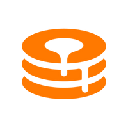-
 Bitcoin
Bitcoin $84,140.6204
-0.65% -
 Ethereum
Ethereum $1,571.7107
-1.08% -
 Tether USDt
Tether USDt $0.9999
-0.01% -
 XRP
XRP $2.0657
-1.57% -
 BNB
BNB $587.0749
0.63% -
 Solana
Solana $131.5042
2.64% -
 USDC
USDC $0.9999
0.00% -
 TRON
TRON $0.2477
-2.84% -
 Dogecoin
Dogecoin $0.1541
-0.47% -
 Cardano
Cardano $0.6147
0.44% -
 UNUS SED LEO
UNUS SED LEO $9.0845
-3.46% -
 Chainlink
Chainlink $12.3082
-0.44% -
 Avalanche
Avalanche $18.9724
-0.49% -
 Toncoin
Toncoin $2.9419
1.59% -
 Stellar
Stellar $0.2373
-0.06% -
 Shiba Inu
Shiba Inu $0.0...01167
-1.19% -
 Sui
Sui $2.0762
-1.59% -
 Hedera
Hedera $0.1594
0.08% -
 Bitcoin Cash
Bitcoin Cash $329.6626
2.63% -
 Polkadot
Polkadot $3.5903
0.80% -
 Litecoin
Litecoin $74.4026
-0.45% -
 Hyperliquid
Hyperliquid $16.1660
1.52% -
 Dai
Dai $1.0000
-0.01% -
 Bitget Token
Bitget Token $4.3245
-0.26% -
 Ethena USDe
Ethena USDe $0.9991
-0.01% -
 Pi
Pi $0.6112
-1.00% -
 Monero
Monero $215.3188
-1.23% -
 Uniswap
Uniswap $5.1249
-1.18% -
 OKB
OKB $50.3147
-2.91% -
 Pepe
Pepe $0.0...07131
-0.66%
What does blockchain mean and how does it apply to IoT?
Blockchain enhances IoT security by providing a decentralized, tamper-proof data storage and transmission method, eliminating single points of failure and enabling secure device communication.
Apr 07, 2025 at 04:21 pm
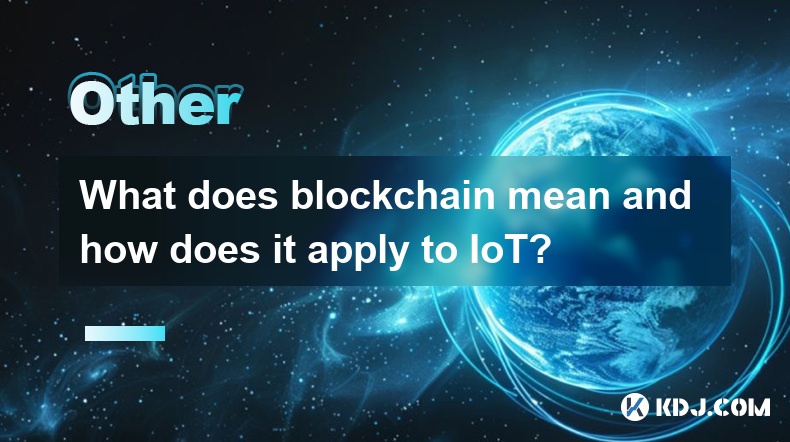
Blockchain technology is a decentralized, distributed ledger system that records transactions across numerous computers. This ensures that the data is not stored in a single location but is instead spread across a network, making it highly secure and resistant to tampering. In the context of cryptocurrencies, blockchain serves as the underlying technology for digital currencies like Bitcoin and Ethereum, enabling secure and transparent transactions without the need for intermediaries like banks.
The core concept of blockchain involves blocks of data that are chained together using cryptographic methods. Each block contains a list of transactions, and once a block is added to the chain, it cannot be altered. This immutability is one of the key features that make blockchain attractive for various applications, including the Internet of Things (IoT).
How Blockchain Enhances IoT Security
IoT devices, such as smart home appliances, wearables, and industrial sensors, generate vast amounts of data. This data needs to be securely stored and transmitted, which is where blockchain comes into play. By integrating blockchain with IoT, the security of these devices and their data can be significantly enhanced. Blockchain's decentralized nature means that there is no single point of failure, reducing the risk of cyberattacks.
Moreover, blockchain can facilitate secure communication between IoT devices. Each device can have its own digital identity on the blockchain, allowing for authenticated and encrypted data exchanges. This is particularly important in scenarios where sensitive data, such as health information from wearable devices, needs to be shared securely.
Blockchain and IoT: Use Cases
One of the prominent use cases of blockchain in IoT is in supply chain management. IoT devices can track products from the manufacturer to the end consumer, and blockchain can ensure that this data is tamper-proof and transparent. For instance, a smart refrigerator can log the temperature of perishable goods, and this data can be recorded on a blockchain, ensuring that all parties in the supply chain have access to accurate and unaltered information.
Another use case is in smart homes. Blockchain can enable secure and automated transactions between smart devices. For example, a smart thermostat can automatically purchase energy from a decentralized energy market based on real-time data and predefined rules, all secured by blockchain technology.
Challenges and Considerations
Despite its potential, integrating blockchain with IoT comes with challenges. One major issue is the scalability of blockchain networks. As the number of IoT devices grows, the blockchain network must be able to handle the increased load without compromising performance. Solutions like sharding and off-chain transactions are being explored to address this issue.
Another consideration is the energy consumption associated with some blockchain networks, particularly those that use proof-of-work consensus mechanisms. For IoT devices, which are often battery-powered, this can be a significant concern. More energy-efficient consensus mechanisms, such as proof-of-stake, are being developed to mitigate this issue.
Additionally, the complexity of blockchain technology can be a barrier to its adoption in IoT. Developers and businesses need to have a good understanding of how to implement and manage blockchain systems, which can be a steep learning curve.
Future Prospects
The future of blockchain in IoT looks promising, with ongoing research and development aimed at overcoming current challenges. As blockchain technology matures, we can expect to see more seamless integration with IoT devices, leading to enhanced security, efficiency, and new business models.
For instance, decentralized applications (dApps) built on blockchain could enable new forms of IoT interactions, such as peer-to-peer energy trading in smart grids. These applications could revolutionize how we think about and interact with our connected devices, making them more autonomous and secure.
Implementation Steps for Blockchain in IoT
Implementing blockchain in IoT involves several steps:
- Identify the Use Case: Determine the specific IoT application where blockchain can add value, such as supply chain management or smart home automation.
- Choose the Right Blockchain Platform: Select a blockchain platform that suits the needs of the IoT application. Platforms like Ethereum, Hyperledger Fabric, and IOTA are popular choices.
- Develop a Secure Network: Set up a secure blockchain network that can handle the data from IoT devices. This may involve setting up nodes and ensuring they are properly configured.
- Integrate IoT Devices: Connect IoT devices to the blockchain network. This may require developing custom firmware or using existing IoT platforms that support blockchain integration.
- Implement Smart Contracts: Use smart contracts to automate transactions and interactions between IoT devices. Smart contracts can enforce rules and execute actions based on predefined conditions.
- Test and Deploy: Thoroughly test the integrated system to ensure it meets security and performance requirements. Once tested, deploy the system in a real-world environment.
- Monitor and Maintain: Continuously monitor the system for any issues and perform regular maintenance to ensure optimal performance and security.
Common Questions and Answers
Q: What is blockchain technology?
A: Blockchain technology is a decentralized, distributed ledger system that records transactions across numerous computers. It ensures data integrity and security through cryptographic means, making it ideal for applications like cryptocurrencies and IoT.
Q: How does blockchain enhance IoT security?
A: Blockchain enhances IoT security by providing a decentralized and tamper-proof method of storing and transmitting data. It eliminates single points of failure and enables secure, authenticated communication between IoT devices.
Q: What are some use cases of blockchain in IoT?
A: Use cases include supply chain management, where IoT devices track products and blockchain ensures data integrity, and smart homes, where blockchain enables secure and automated transactions between devices.
Q: What are the challenges of integrating blockchain with IoT?
A: Challenges include scalability issues, energy consumption concerns, and the complexity of blockchain technology, which can be a barrier to adoption.
Q: What are the future prospects for blockchain in IoT?
A: The future looks promising with ongoing research aimed at overcoming current challenges. We can expect more seamless integration, leading to enhanced security, efficiency, and new business models like decentralized applications for IoT interactions.
Disclaimer:info@kdj.com
The information provided is not trading advice. kdj.com does not assume any responsibility for any investments made based on the information provided in this article. Cryptocurrencies are highly volatile and it is highly recommended that you invest with caution after thorough research!
If you believe that the content used on this website infringes your copyright, please contact us immediately (info@kdj.com) and we will delete it promptly.
- Kaspa (KAS) Price Prediction Hints at Accumulation Before Potential Surge
- 2025-04-17 22:15:13
- FET Price Prediction: Artificial Superintelligence Alliance (FET) Cryptocurrency Rebounds 10%
- 2025-04-17 22:15:13
- U.S. President Donald Trump Slammed Fed Chair Jerome Powell
- 2025-04-17 22:15:12
- Running a laundromat can't be as "easy" as potential investors may believe it is
- 2025-04-17 22:15:12
- BlockDAG (BDAG) Presale Explosion and Mobile Mining Powerhouse
- 2025-04-17 22:05:12
- Solana (SOL) Price Prediction: Eyes on $180 as Structure Turns Bullish
- 2025-04-17 22:05:12
Related knowledge
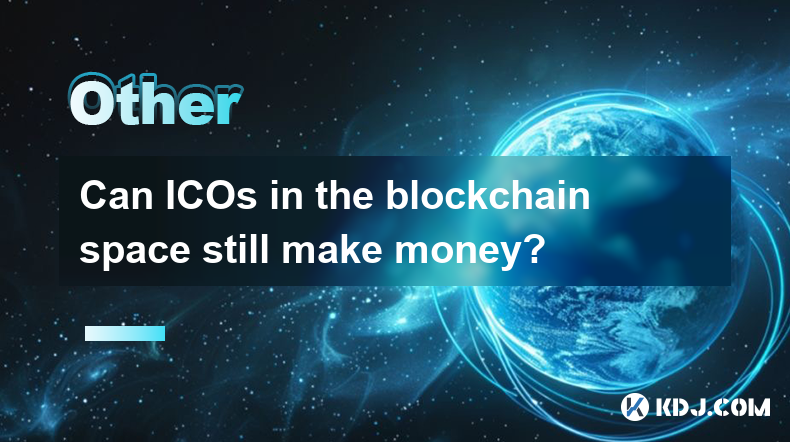
Can ICOs in the blockchain space still make money?
Apr 17,2025 at 08:29pm
The landscape of Initial Coin Offerings (ICOs) in the blockchain space has evolved significantly since their peak in 2017 and 2018. Despite the increased regulatory scrutiny and the rise of alternative fundraising methods like Security Token Offerings (STOs) and Initial Exchange Offerings (IEOs), ICOs can still be a viable way to raise funds and generat...
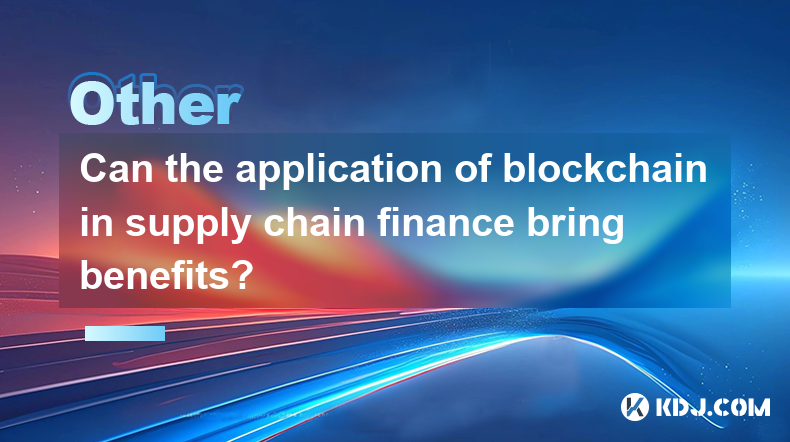
Can the application of blockchain in supply chain finance bring benefits?
Apr 15,2025 at 04:00pm
Can the application of blockchain in supply chain finance bring benefits? The integration of blockchain technology into supply chain finance has garnered significant attention in the cryptocurrency and financial sectors. This article explores how blockchain can potentially revolutionize supply chain finance, detailing its benefits and providing a compre...

Does the ranking of Chinese blockchain apps include cross-chain applications?
Apr 14,2025 at 04:00pm
The ranking of Chinese blockchain apps is a comprehensive evaluation that takes into account various aspects such as user base, transaction volume, and technological innovation. A pertinent question arises regarding whether these rankings include cross-chain applications. Cross-chain applications, which allow different blockchain networks to interact an...
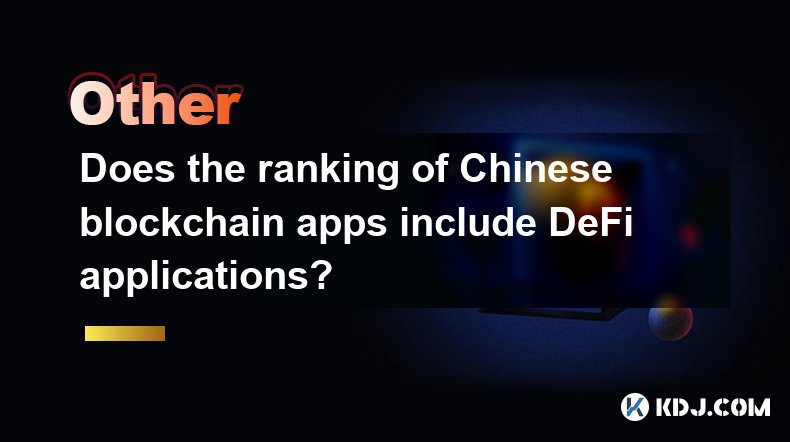
Does the ranking of Chinese blockchain apps include DeFi applications?
Apr 15,2025 at 06:57am
The ranking of Chinese blockchain apps is a comprehensive list that showcases the most popular and influential applications within the cryptocurrency ecosystem. One question that often arises is whether these rankings include DeFi applications. To answer this, we need to delve into the specifics of how these rankings are compiled and what types of appli...
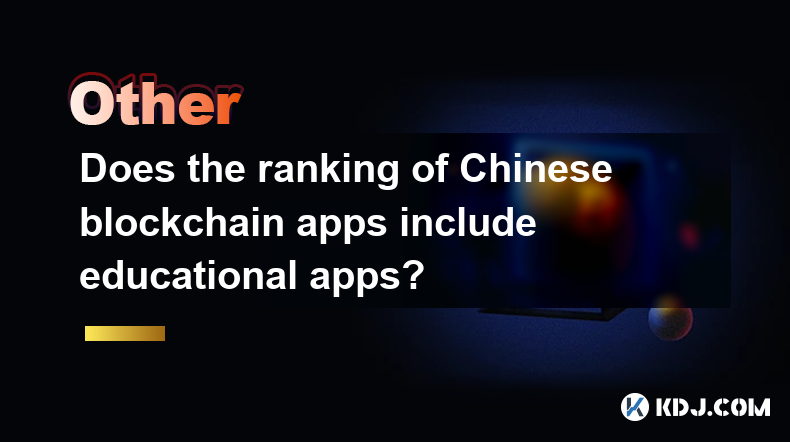
Does the ranking of Chinese blockchain apps include educational apps?
Apr 16,2025 at 03:35am
The ranking of Chinese blockchain apps often includes a variety of categories, from finance and gaming to social networking and beyond. One question that frequently arises is whether these rankings include educational apps. To address this, we need to delve into the specifics of how blockchain apps are categorized and ranked in China, and whether educat...
Does the ranking of Chinese blockchain apps include enterprise-level applications?
Apr 15,2025 at 06:42am
The ranking of Chinese blockchain apps often includes a variety of applications, ranging from consumer-focused to enterprise-level solutions. Understanding the scope and criteria for these rankings is essential to determine if enterprise-level applications are included. This article delves into the specifics of how Chinese blockchain app rankings are co...

Can ICOs in the blockchain space still make money?
Apr 17,2025 at 08:29pm
The landscape of Initial Coin Offerings (ICOs) in the blockchain space has evolved significantly since their peak in 2017 and 2018. Despite the increased regulatory scrutiny and the rise of alternative fundraising methods like Security Token Offerings (STOs) and Initial Exchange Offerings (IEOs), ICOs can still be a viable way to raise funds and generat...

Can the application of blockchain in supply chain finance bring benefits?
Apr 15,2025 at 04:00pm
Can the application of blockchain in supply chain finance bring benefits? The integration of blockchain technology into supply chain finance has garnered significant attention in the cryptocurrency and financial sectors. This article explores how blockchain can potentially revolutionize supply chain finance, detailing its benefits and providing a compre...

Does the ranking of Chinese blockchain apps include cross-chain applications?
Apr 14,2025 at 04:00pm
The ranking of Chinese blockchain apps is a comprehensive evaluation that takes into account various aspects such as user base, transaction volume, and technological innovation. A pertinent question arises regarding whether these rankings include cross-chain applications. Cross-chain applications, which allow different blockchain networks to interact an...

Does the ranking of Chinese blockchain apps include DeFi applications?
Apr 15,2025 at 06:57am
The ranking of Chinese blockchain apps is a comprehensive list that showcases the most popular and influential applications within the cryptocurrency ecosystem. One question that often arises is whether these rankings include DeFi applications. To answer this, we need to delve into the specifics of how these rankings are compiled and what types of appli...

Does the ranking of Chinese blockchain apps include educational apps?
Apr 16,2025 at 03:35am
The ranking of Chinese blockchain apps often includes a variety of categories, from finance and gaming to social networking and beyond. One question that frequently arises is whether these rankings include educational apps. To address this, we need to delve into the specifics of how blockchain apps are categorized and ranked in China, and whether educat...

Does the ranking of Chinese blockchain apps include enterprise-level applications?
Apr 15,2025 at 06:42am
The ranking of Chinese blockchain apps often includes a variety of applications, ranging from consumer-focused to enterprise-level solutions. Understanding the scope and criteria for these rankings is essential to determine if enterprise-level applications are included. This article delves into the specifics of how Chinese blockchain app rankings are co...
See all articles


















































































